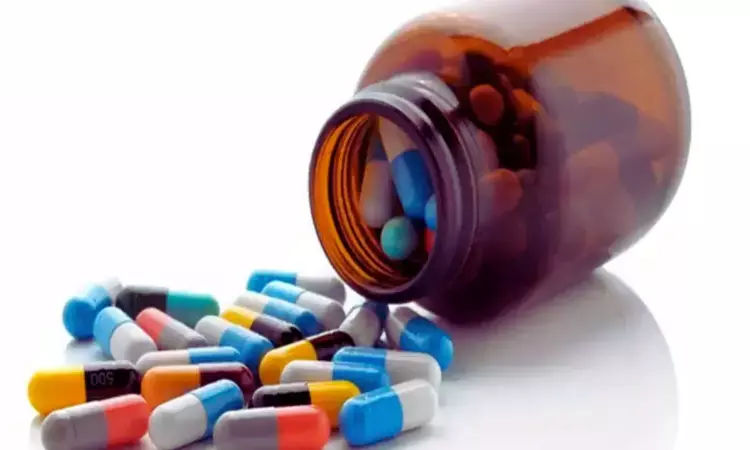- Home
- Medical news & Guidelines
- Anesthesiology
- Cardiology and CTVS
- Critical Care
- Dentistry
- Dermatology
- Diabetes and Endocrinology
- ENT
- Gastroenterology
- Medicine
- Nephrology
- Neurology
- Obstretics-Gynaecology
- Oncology
- Ophthalmology
- Orthopaedics
- Pediatrics-Neonatology
- Psychiatry
- Pulmonology
- Radiology
- Surgery
- Urology
- Laboratory Medicine
- Diet
- Nursing
- Paramedical
- Physiotherapy
- Health news
- Fact Check
- Bone Health Fact Check
- Brain Health Fact Check
- Cancer Related Fact Check
- Child Care Fact Check
- Dental and oral health fact check
- Diabetes and metabolic health fact check
- Diet and Nutrition Fact Check
- Eye and ENT Care Fact Check
- Fitness fact check
- Gut health fact check
- Heart health fact check
- Kidney health fact check
- Medical education fact check
- Men's health fact check
- Respiratory fact check
- Skin and hair care fact check
- Vaccine and Immunization fact check
- Women's health fact check
- AYUSH
- State News
- Andaman and Nicobar Islands
- Andhra Pradesh
- Arunachal Pradesh
- Assam
- Bihar
- Chandigarh
- Chattisgarh
- Dadra and Nagar Haveli
- Daman and Diu
- Delhi
- Goa
- Gujarat
- Haryana
- Himachal Pradesh
- Jammu & Kashmir
- Jharkhand
- Karnataka
- Kerala
- Ladakh
- Lakshadweep
- Madhya Pradesh
- Maharashtra
- Manipur
- Meghalaya
- Mizoram
- Nagaland
- Odisha
- Puducherry
- Punjab
- Rajasthan
- Sikkim
- Tamil Nadu
- Telangana
- Tripura
- Uttar Pradesh
- Uttrakhand
- West Bengal
- Medical Education
- Industry
Higher dose of super-bioavailable itraconazole not required for obese patients with dermatophytosis, new study claims

India: A recent study published in the Indian Dermatology Online Journal sought to compare the safety and efficacy of once-daily super-bioavailable itraconazole (SITZ)-130 mg in obese and non-obese patients of glabrous tinea.
The researchers revealed that once daily, SITZ-130 mg achieved a similar and desired clinical response in obese as in non-obese patients suffering from dermatophytosis, and hence, a higher dose may not be needed in obesity.
Dermatophytosis has epidemic proportions in India, with an astonishing prevalence rate of 37–74% and an increase in resistant cases. Obesity has been recognized as one of the major risk factors for this transformation. These modifications have led to the evaluation of the present care of dermatophytosis into a combination therapy that includes itraconazole, the most widely prescribed systemic antifungal drug along with topical antifungal.
The Central Drugs Standard Control Organisation (CDSCO) in India recently approved a more recent itraconazole formulation (ITZ), super-bioavailable itraconazole due to pharmacokinetic challenges of conventional formulation of itraconazole, such as the need for an acidic environment for optimal absorption and food dependency. There have been mixed opinions regarding the dosing of systemic antifungals for dermatophytosis management in obese patients.
Dhiraj Dhoot, Global Medical Affairs, Glenmark Pharmaceuticals Ltd, Mumbai, Maharashtra, India, and colleagues, therefore, aimed to compare the safety and efficacy of SITZ-130 mg once daily in glabrous tinea or dermatophytosis in obese and non-obese patients for a total duration of 10 weeks on 87 eligible patients.
Safety and efficacy assessments were done at weeks 3 and 6 with follow-up at week 10 for relapse. The primary objective of the clinical study was to assess the proportion of patients achieving complete cure at week 6, with the assessment of clinical, safety, and mycological cure rates as secondary objectives. Out of 87 eligible patients, 80 were considered for analysis.
The researchers led to the following findings:
- At week 6, 63% and 73% of patients in obese and non-obese groups were completely cured.
- There was no statistically significant difference in mycological and clinical cure in both groups.
- Four patients in the obese group (18% completely cured), while one patient in the non-obese group (3% completely cured), relapsed within 4 weeks of completion of treatment.
- The therapy was well tolerated by both groups, with only one patient in the non-obese group experiencing pruritus.
"From the results, it can be concluded that obesity posed one of the risk factors for dermatophytosis," the researchers wrote. "Additionally, SITZ-130 mg once daily achieved similar and desired clinical response in obese patients and non-obese patients suffering from dermatophytosis, and hence, a higher dose may not be required in obesity."
The small sample size and duration of treatment were the limitations of the study. Hence, the authors warrant a comparative clinical study with a larger sample size and for a longer duration.
Reference:
Shenoy, Manjunath; De, Abhishek1; Shah, Bela2; Das, Anupam3; Saraswat, Abir4; Lahiri, Koushik1; Dhoot, Dhiraj5. Comparative Efficacy and Safety of Super-Bioavailable Itraconazole-130 mg Once Daily in Obese and Non-Obese Patients of Glabrous Tinea. Indian Dermatology Online Journal 14(6):p 839-843, Nov–Dec 2023. | DOI: 10.4103/idoj.idoj_120_23
Dr Kamal Kant Kohli-MBBS, DTCD- a chest specialist with more than 30 years of practice and a flair for writing clinical articles, Dr Kamal Kant Kohli joined Medical Dialogues as a Chief Editor of Medical News. Besides writing articles, as an editor, he proofreads and verifies all the medical content published on Medical Dialogues including those coming from journals, studies,medical conferences,guidelines etc. Email: drkohli@medicaldialogues.in. Contact no. 011-43720751


